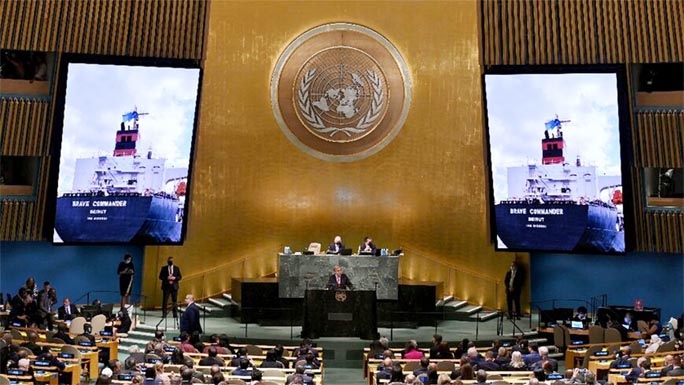
BSS :
World leaders warned on Tuesday that the Ukraine war risked creating a new era of divisions at a time when worsening climate change and rising food prices risk unleashing new instability.
The UN General Assembly, the annual gathering of world leaders that clogs Midtown Manhattan, returned in person after two years of pandemic restrictions with only one leader allowed to appear virtually — Ukrainian President Volodymyr Zelensky. UN Secretary-General Antonio Guterres opened the summit by projecting images of a ship carrying grain out of Ukraine — evidence of how diplomacy can succeed — as he warned of the dire state of the planet.
“Our world is in big trouble. Divides are growing deeper,” Guterres said. “A winter of global discontent is on the horizon,” he added. “Trust is crumbling, inequalities are exploding, our planet is burning. People are hurting — with the most vulnerable suffering the most.” With global temperatures rising and a chunk of Pakistan the size of the United Kingdom recently under water, Guterres lashed out at fossil fuel companies and the “suicidal war against nature.”
He called on developed economies to tax profits from fossil fuels and dedicate the funds both to compensate for damage from climate change and to help people struggling with high prices. “Let’s tell it like it is — Our world is addicted to fossil fuels. It’s time for an intervention. We need to hold fossil fuel companies and their enablers to account,” Guterres said.
The summit still saw disruption due to the death of Queen Elizabeth II, with President Joe Biden of the United States, by tradition the second speaker on the opening day, instead due to speak on Wednesday.
Just as leaders huddled at the UN about the war in Ukraine, Russian-backed forces announced they were going ahead with a move the West had long warned against — referendums on annexation by Moscow.
French President Emmanuel Macron described Russia’s invasion as “a return to a new age of imperialism and colonies” and warned that inaction risked “tearing down the global order without which peace is not possible.” “It’s not a matter of choosing one side between East and West, or North or South. It’s a matter of responsibility” to the UN Charter, he said. “Beyond the war, there is a risk of division in the world for reasons both direct and indirect from the conflict.”
But a number of developing nations have resisted Western calls to punish Russia and have voiced unease about the billions of dollars being spent on weapons for Ukraine.
“Africa has suffered enough from the burden of history,” said Senegalese President Macky Sall, the current chair of the African Union, as he pleaded for a “negotiated solution” in Ukraine. “It does not want to be the breeding ground of a new cold war.”
Turkish President Recep Tayyip Erdogan, who has fashioned himself as a mediator, called for an end to the war that recognizes Ukraine’s sovereignty and territorial integrity. “Together, we need to find a reasonably practical diplomatic solution that will give both sides a dignified way out of the crisis,” Erdogan told the General Assembly.
The new Philippine president, Ferdinand Marcos Jr, also alluded to tensions between the United States and China. “In Asia, our hard-won peace and stability is under threat by increasing strategic and ideological tensions,” he said.
Among leaders visiting New York was Iranian President Ebrahim Raisi, a hardliner who took office last year and faced noisy demonstrations on the streets of Manhattan.
While talks with Iran at the United Nations once again focused on the fate of a 2015 nuclear accord, Raisi traveled as protests grip his country following the death of a young woman arrested by “morality police.”
Chilean President Gabriel Boric, a leftist former student leader, in his UN speech paid tribute to 22-year-old Mahsa Amini, who was arrested by the unit responsible for enforcing the Islamic republic’s strict dress code for women. Boric called for “an end to abuses by the powerful everywhere,” including Russia’s “unjust war in Ukraine” and “violence against women” in Iran and elsewhere.
Iranian dissidents announced they had filed a new lawsuit in US courts against Raisi over his role as a judge following the Islamic revolution in which thousands were sentenced to death.
Raisi went ahead with meetings, including with Macron, who is seeking to revive the nuclear accord trashed by former US president Donald Trump. “The ball is in Iran’s court,” Macron said.
Biden supports the accord, under which Iran drastically scaled back nuclear work in return for sanctions relief. But Macron said Raisi repeated his demand for “guarantees” a future US leader will not ditch the deal, a promise the Biden administration considers impossible.

